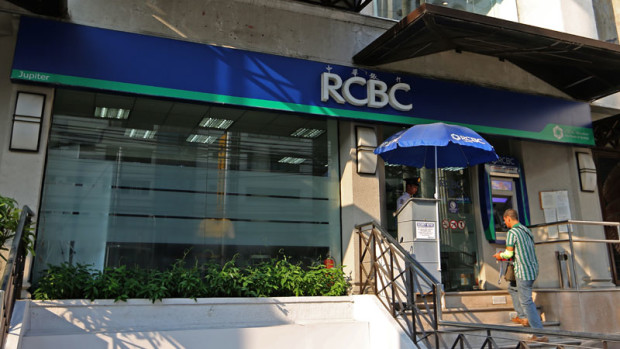AMLC to file charges vs RCBC execs

Rizal Commercial Banking Corporation (RCBC) at Jupiter Street, Makati. INQUIRER FILE PHOTO/RAFFY LERMA
Before the end of this month, the Anti-Money Laundering Council (AMLC) will file charges against officials of Rizal Commercial Banking Corp. (RCBC) in connection with the entry of money stolen from Bangladesh’s central bank last February, an official said Monday.
The Yuchengco-led bank will also be slapped nonmonetary penalties for insufficiently guarding against the $81-million money laundering scandal that shook the domestic financial system and the gaming industry, Bangko Sentral ng Pilipinas (BSP) Deputy Governor Nestor A. Espenilla Jr. told a Senate hearing on the proposed amendments to the Anti-Money Laundering Act as well as bank secrecy laws.
“There are enforcement actions in place for which the bank has committed to fulfill and address concerns,” Espenilla said when asked by Sen. Francis G. Escudero, who chairs the Senate committee on banks, financial institutions and currencies, if the P1-billion fine slapped on RCBC was the “end” of the penalties it should face.
To recall, the BSP last month imposed the single-biggest monetary penalty on an erring financial institution in the country’s history in the wake of the Bangladesh Bank cyberheist.
The BSP had said that RCBC’s penalty represented “the largest amount ever approved as part of its supervisory enforcement actions on a BSP-supervised financial institution.”
The fine levied on RCBC marked a sharp departure from the BSP’s standard practice of imposing a legally mandated fine of P30,000 per violation per day on financial institutions found to have violated banking regulations.
During the hearing, AMLC deputy director Vencent L. Salido said cases would be filed against RCBC officials “in the next two weeks.”
“We filed cases against the branch managers, against [casino junked operator] Kim Wong, against the officers of Philrem (remittance firm). Now, there’s a missing link there. We have an ongoing investigation on RCBC officials,” Salido later told reporters.
“Definitely, we will file cases because the facts are incomplete—the facts wouldn’t be complete without them,” Salido added, pointing out that the transactions went through the bank, hence making its officials liable.
Salido said the AMLC secretariat would recommend to council members the filing of money-laundering cases before the Department of Justice against RCBC officials, but he declined to say who and how many executives would face charges.
“We go back again to the definition of money laundering. The issue there is, who has knowledge of the existence of the crime in the chain? That’s the hard part—how do we know that they’re aware? In fact, if you look at the counter-affidavits of the other personalities, they have all denied having knowledge of the predicate crime. So that defense will already weaken the compliant. Money laundering without knowledge of the predicate crime, there’s nothing,” Salido noted.
“But, of course, there are other ways to establish knowledge; not only direct knowledge but also circumstances like [those in the] documents. You know exactly that the transaction is illegal, but why did you allow it? So we had to find documentary evidence. In so far as testimony, no one will tell us from the banks,” he said.
